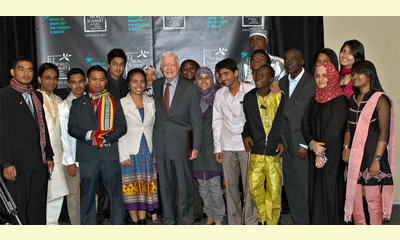|
|
Nobel Laureates Close Summit with Appeal to World’s Youth
an article by Global Campaign for Peace Education News Blog
The 12th World Summit of Nobel Peace Laureates took place April 23 – 25 where laureates brought their messages of peace, human rights, and individual responsibility to students, government leaders, international dignitaries and the general public. Nobel Peace Laureates closed their summit in Chicago by appealing to the world’s youth to pursue a better future. Following is the appeal:

Youth leaders from Bangladesh, Liberia, Timor Leste and Yemen meet with former U.S. President and Nobel laureate Jimmy Carter at the 12th World Summit of Nobel Laureates-- which took place in Chicago from April 23 – 25, 2012 (photo from US Department of State)
click on photo to enlarge
APPEAL TO THE YOUTH OF THE WORLD
As Nobel Peace Laureates and Laureate organizations we realize that if the commitment to peace and human rights is not passed from one generation to the next our achievements will be short lived. For this reason we applaud the youth the world over who are standing up and speaking out in protest against injustice and inequality and defending the right to peace, social justice and a sustainable future.
We are concerned that old threats to peace are persisting and new ones emerging. We therefore urge young people to organize for peace and learn to prevent and resolve conflicts peacefully. At a time when militarism continues to corrupt the minds of politicians and poison international relations, when a new arms race is unfolding, this must be a key priority. As Nobel Laureate Martin Luther King, Jr. said, “those who love peace must learn to organize as effectively as those who love war.”
Our collective security can no longer focus primarily on the security of states; it must focus on the security of people. Wars and militarism cannot achieve real human security.
Substantial reductions of world military expenditures could eliminate the crushing poverty whereby nearly one third of humanity lives in insufferable conditions. Excessive military expenditures not only represent a theft from those who are hungry but are also an ineffective means of obtaining security.
Equally unacceptable is violence against nature that ruins the environment upon which civilization depends.
All the world’s religions and peoples share similar basic values, such as peace, compassion, love, justice, service toward others, and the alleviation of suffering. Political leaders must recognize our common humanity through deeds rather than mere words.
We urge young people to question leaders about what they are doing to address the main challenges that face the world today:
» What are you doing for the abolition of nuclear arms and other indiscriminate weapons and for reduction of military spending?
» What are you doing to bridge the divide between wealth and crushing poverty?
» What are doing to save our planet from environmental disaster?
» What are doing to protect and promote human rights and equality between women and men?
We offer the world’s youth our support and our experience as they pursue a better future. We urge them to achieve change through peaceful and moral means. We need your enthusiasm and we want you to join us in our continued quest for peace and justice.
|








|
DISCUSSION
Question(s) related to this article:
How can youth be engaged in democratic transitions?,
* * * * *
Latest reader comment:
The youth in the article Democratic Transitions and the Role of Youth: A Debate are good examples:
Hilton Nyamukapa has recently taken part on a conference on Social Media and Youth Participation located in Amman, Jordan. Fatma Wakil has been actively involved within the Afghan community in the Netherlands as the chairperson of the KEIHAN, Afghan Youth Foundation. Yassine Boussaid is interested in connecting local issues to international organisations and improving the quality of life of the Moroccan and Turkish suburbs of Amsterdam.
Hilton concluded that it is necessary to the positive engagement and subscription of youth to democracy. The youth are often manipulated for a better picture in the media. Hilton cited the memorable injunction of the former President of USA, John F. Kennedy: "Ask not what your country can do for you--ask what you can do for your country." Hilton highlighted the urge to involve youth in the whole democratic process and give them the opportunity to participate in public life.

|
|









